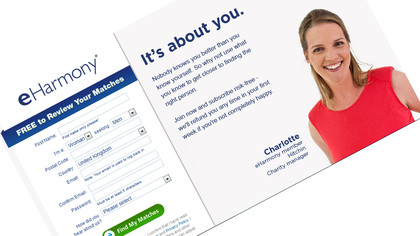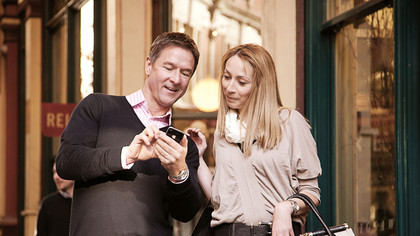Digital love: how data can help your dating
Online dating site eHarmony reveals all
If you liked her…
Recommendation engines have become part and parcel with the internet – you only have to go on Amazon once and the site will cater itself to you the next time you log on, offering up goods it believes you will like – but Essas notes that eHarmony's recommendations are a little different from the norm.
"If you look at other recommendation engines, like the ones used by Netflix and Amazon, they can show you a movie you might like but in our case the movie has to like you back.
"So we can't just recommend someone to you – it has to go two ways. That's a challenge, because someone may be perfect for you but you may not be perfect for them."

A cynic would suggest that eHarmony's long, drawn out process for finding love is all there to keep people as members of the site for as long as possible – you pay a monthly fee to be part of it – but Essas believes that it takes shorter than you think to find love online.
"We just finished a study of 8,000 couples that were picked out of our pool of successful couples and we analysed their patterns and how they got to the point they did. And we found it takes about a month before you find someone to go on a long term date with," said Essas.
"And it takes about five to six two-way interactions with people before you have a date that could go long term.
eHarmony: "Even if privacy is disappearing on the web, it is a feature people cherish a lot more in the dating world."
Sign up for breaking news, reviews, opinion, top tech deals, and more.
"We did this study as we wanted to understand how people use the site. We found it takes time but it was eye-opening how fast it was. I expected it to take a lot longer."
The love network
As eHarmony has been around for 12 years, the site has survived through massive changes on the web. Now social networks rule the roost, something you would assume would take people away from dating sites but Essas doesn't think this is the case.
"Social networks and dating is a tricky proposition. People tend to try and keep their dating activity out of the social graph.
"If your friends see you go on one date and that goes nowhere, then another and then another… suddenly you are seen as a loser.

"People try and keep them separate. In general social networks are a self promotion tool. You usually post things that make you look good and not really things that make you look bad.
"When you sign up to eHarmony your whole social graph doesn't know – that would be creepy."
Essas also believes that dating sites like eHarmony are relief from today's 'open' web, where people post more about themselves online than they ever have.
Given that when signing up to eHarmony you have to reveal more about yourself than you have to even your closest friends, this is a interesting way to look at it but Essas believes it all has to do with the sensitivity of finding love.
"Even if privacy is disappearing on the web, it is a feature people cherish a lot more in the dating world," said Essas.
"If you dig deeper into demographics, the much younger they are, they find privacy isn't important. When you get older you realise that what you put online matters – when you go for a job and your potential boss checks you Facebook and sees your drunken images, it's not exactly going to go in your favour.
"In dating you deal with people's feelings, emotions – occasionally their heartbreaks. And people are a lot more protective of that."

Marc Chacksfield is the Editor In Chief, Shortlist.com at DC Thomson. He started out life as a movie writer for numerous (now defunct) magazines and soon found himself online - editing a gaggle of gadget sites, including TechRadar, Digital Camera World and Tom's Guide UK. At Shortlist you'll find him mostly writing about movies and tech, so no change there then.